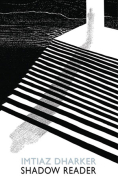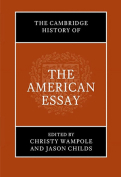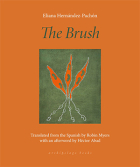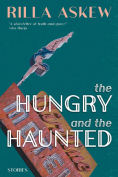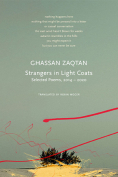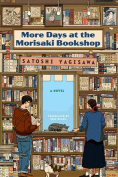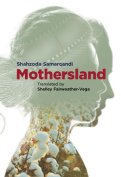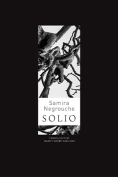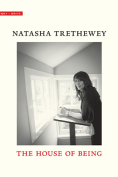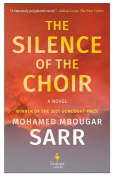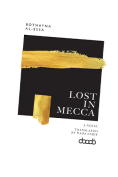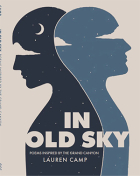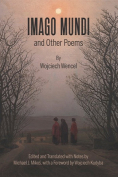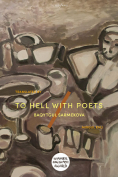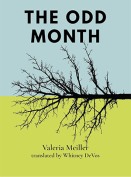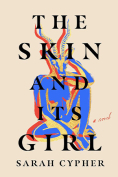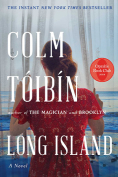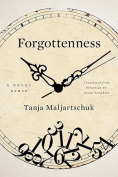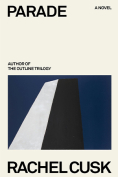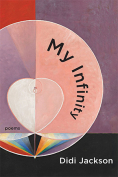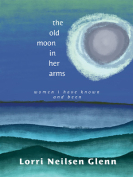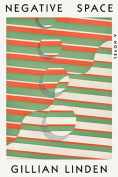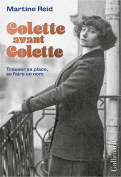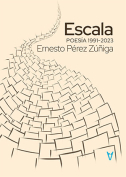My Infinity by Didi Jackson
 Pasadena, California. Red Hen Press. 2024. 96 pages.
Pasadena, California. Red Hen Press. 2024. 96 pages.
My Infinity is a volume that puts Didi Jackson’s talent on full display. This is only her second poetry volume (the first, Moon Jar, was published in 2020), but it reads like the work of an accomplished poet. Her poetic territory is made clear and her voice well defined. It is introspective and yet observant of the outside world, confessional yet studiously avoidant of the mawkish or egotistical.
As in the work of many excellent poets, Jackson crafts a voice that is uniquely defined yet also shades into its surroundings, so that even when we are plunged into personal remembrance, we are also made aware of the trees and the birds, the crescent moon, and the color of the sky. She is remarkably at home in the natural world. The Green Mountains of Vermont are evoked in precise detail, and indeed, Jackson makes clear that the details of identification carry an importance that goes beyond mere appreciation.
Poem after poem confronts the great horror of the poet’s life: the suicide of her first husband. Thus one that appears to concern the process of learning from nature turns abruptly toward an image of ashes, summoning cremation; eventually, readers come to expect this engagement with trauma. Perhaps, as the poems suggest, the idea of finding answers or coming to terms with such events is facile: we can offer the words and images with which to describe trauma, but there are no answers to be found. As contemporary psychologists and literary scholars have taken issue with the idea of successful mourning and resolved grief, so poetry offers us its own way of working through this topic. Here, Jackson’s volume is exemplary.
My Infinity may question the notion of finding answers, but it is attracted to meaning-making systems. There is a sequence of poems partially ventriloquized through the Swedish mystic Hilma af Klimt, who produced visually arresting abstract art and believed that the “High Lords of the Mysteries” spoke through her. She was part of a group of five female mystics, De Fem, whose practices inspire Jackson. This sort of material runs the risk of becoming programmatic, but Jackson manipulates it carefully. She moves seamlessly from Hilma’s perspective to the poet’s own. Indeed, it can be surprising to suddenly realize that we are within her own life, remembering the appearance of pondshells found in her childhood backyard, summoning natural objects that have the same whorllike shapes beloved by Hilma for their symbolic resonance. The mystic becomes a touchstone for the volume, to be summoned as a kindred soul: “Like Hilma, I want to decode it all,” Jackson writes but, in a shockingly plainspoken moment, admits she will never know the reason for her husband’s suicide. Hilma’s image of a human soul divided into two parts now reflects the poet’s own split between sorrow and “reawakening.”
The real achievement of these poems lies in their fusion of the plain and the intricate. The volume’s emotional stakes are clear, its anecdotes lucid and poignant, its images readily comprehensible. Yet the poems also reach out, sometimes obviously and sometimes obliquely, toward other poets through the use of epigraphs and, secondarily, allusions: “it is the darkest days / I’ve learned to praise,” writes the poet with her signature candor, yet her personal situation ramifies outward by means of the echo established with Derek Walcott’s assertion: “the dark days also I have praised.” Just as the latter poet established himself as both a sensual celebrant of his lush Caribbean landscape and a sharp critic of empire and neocolonialism, so Jackson is also split between celebrant and mourner, even as both identities are deftly fused. The poems’ epigraphs summon a handful of contemporary writers—W. S. Merwin, Louise Glück, Galway Kinnell, Barry Lopez—yet the poems are never beholden to a vision other than their own. Their free-verse flow is textured by carefully manipulated line endings, which create moments of possibility in which the resonance of the broken phrase is balanced by the longer syntactical unit of meaning. They do not roughen or fragment but, rather, offer brief moments when the reader’s mind must step away from its assumed path into a slightly different track: “This is the time of year we sleep / with the windows open / even in the rain.” Simple, perhaps, but not entirely: the self-enclosure of sleep is revised into an openness toward the outside that becomes a constant contiguity.
My Infinity is a pleasure, and we can only hope to read more from this talented new voice.
Magdalena Kay
University of Victoria
